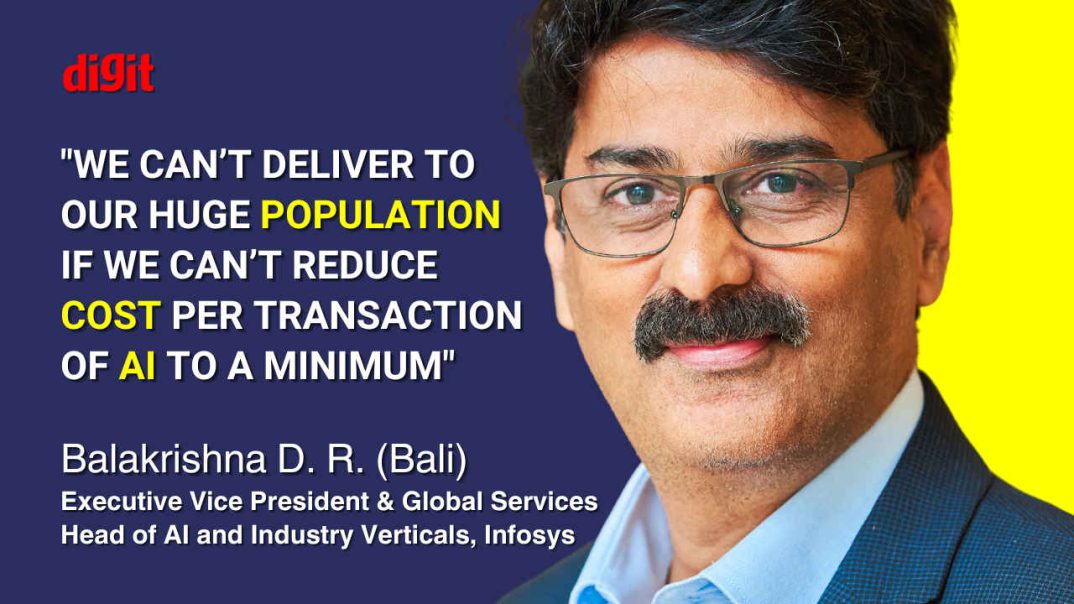As AI systems become increasingly integrated into our daily lives, the ethical considerations surrounding their development and deployment have never been more critical. To delve deeper into this pressing issue, I interviewed Balakrishna D. R. (Bali), Executive Vice President and Global Services Head of AI and Industry Verticals at Infosys.
Bali’s insights shed light on how a global leader like Infosys navigates the complex terrain of AI ethics, balancing the relentless pursuit of technological advancement with a steadfast commitment to responsible practices.
Infosys’ AI vision grounded in responsibility
Infosys doesn’t just dabble in AI, says Bali, it has crafted a comprehensive vision that embeds ethical considerations into every facet of its AI endeavours. “We have enumerated the guiding principles in a Responsible AI (RAI) Vision and Purpose document, laying the foundation for all our AI pursuits,” Bali explained. “It is aligned with our corporate vision and values (CLIFE). A well-articulated RAI Vision is a critical first step for any AI-first enterprise.”
Also read: Navigating the Ethical AI maze with IBM’s Francesca Rossi
He emphasised that despite the rapid evolution of AI technologies — including newer models, agentic frameworks, and hardware platforms — the fundamental principles of Responsible AI remain unchanged. “The seven pillars of RAI at Infosys act as the north star for us and have become a critical differentiator for our AI offerings,” he said. These pillars include Transparency, Fairness, Equal Access, Human + AI (not Human vs. AI), Safeguarding Human Rights, Ethical Innovation, and Global Responsible AI Adoption.
To operationalize these principles, Infosys launched the Responsible AI Suite (AI3S) as part of Infosys Topaz. “It helps enterprises balance innovation with ethical considerations and mitigate risks due to AI adoption,” Bali noted. Driven by the Responsible AI Office — a dedicated team of cross-functional experts — the suite offers a framework that aims to monitor and protect AI models and systems from threats through technical, legal, and process guardrails.
Fairness in AI isn’t a box to be checked but a continuous commitment. Infosys approaches this challenge through interventions at three levels: Strategic, Tactical, and Operational.
At the strategic level, the company builds overarching frameworks and governance structures. “This is where we build well-crafted policies for procurement, deployment, and responsible AI talent reskilling,” Bali explained.

The tactical level involves mechanisms for continuous monitoring. “We install mechanisms like risk and impact assessments, conduct market scans of AI vulnerabilities, perform rigorous red-teaming, and conduct periodic audits,” he said.
Operationally, Infosys focuses on the right processes, legal frameworks, and technical guardrails. “This includes enabling developers with specialised toolkits for building responsibly and developing technical guardrails that monitor and filter the input and output,” Bali added.
Their “Responsible AI by Design” methodology is central to these efforts. It focuses on the nature of the use case, the type of models and data being used, and how the model is trained. “We analyse the use case from varied lenses, select the right model, assess the data used to fine-tune the model, and build runtime guardrails that detect and mitigate subtle biases in generated content,” Bali elaborated.
Also read: In pursuit of ethical AI
Data is the lifeblood of AI, but with great data comes great responsibility. Infosys ensures adherence to global regulations like GDPR, CCPA, and the EU AI Act. “For privacy, we employ RAI by design across the lifecycle,” Bali said. This includes privacy assessments and audits, formulating policies and governance, and implementing technical approaches like homomorphic encryption and federated learning.
He highlighted the importance of developer and user training, as well as automated systems to track and enforce data retention. “Process changes like data anonymization, minimization, and access controls are crucial,” he added.
Collaborative efforts for Ethical AI
Infosys understands that fostering ethical AI practices is not a solitary endeavour. “We have been working with multiple academic bodies, regulatory institutions, and governments as industry consultants for advancing responsible AI,” Bali shared.
Some notable collaborations include membership in the AI Safety Institute Consortium established by NIST, joining the Coalition of Content Provenance and Authenticity (C2PA), and participating in the Artificial Intelligence Governance Alliance (AIGA) spearheaded by the World Economic Forum. “Infosys is also a member of the ISO committees on AI and contributes to the development of future AI standards,” he noted.
Furthermore, the company has partnered with the Stanford University Institute for Human-Centred Artificial Intelligence and joined the AI Alliance alongside leading companies like IBM, Meta, and Intel.
Beyond corporate initiatives, Infosys leverages AI to drive social impact. Bali shared a compelling example: “We have developed an AI accessibility solution for hearing and visually impaired customers of a major broadcasting company. It is a real-time audio and visual captioning system that provides simultaneous scene and dialogue descriptions, enabling individuals with disabilities to fully experience and enjoy entertainment.”
Another initiative is Infosys Springboard, which uses AI to create a digital learning platform aimed at supporting underserved students and professionals in India. “We are building personalised learning assistants that help learners with customised learning paths, adapting to their individual needs and learning styles,” he explained.
AI’s environmental footprint is a growing concern, and Infosys is proactive in addressing it. “We manage our environmental concerns in AI through energy-efficient hardware, data centers, and optimised model designs,” Bali said. “We have built our own optimised AI Cloud with specialised infrastructure, focusing on reducing our AI carbon footprint.”
Infosys is also using AI to optimise its server and data center operations, managing cooling systems and workload distribution to minimise energy consumption. “We have collaborated with Shell to create an integrated solution for green data centers using immersion cooling technology,” he added.

Adopting “Green AI” techniques, Infosys leverages methods like quantization and pruning to reduce compute demands and energy usage. “We conduct intensive assessments to compute and calculate our Scope 3 emissions due to AI by selecting and working with environmentally conscious vendors and partners,” Bali emphasised.
Recognizing that the future of AI lies in the hands of today’s learners, Infosys invests heavily in education and training. “We are empowering the next generation of AI professionals across the globe in multiple ways,” Bali stated.
Initiatives include ethical AI workshops focusing on AI ethics and regional regulations, partnership programs with universities like IIT/IIMs and Kellogg’s, and internal learning platforms offering courses from basic foundations to practitioner levels. “Our internship program InStep has focused projects on responsible AI,” he added.
Also read: How is Sam Altman redefining AI beyond ChatGPT?
Infosys also contributes to open-source AI ethics tools and hosts hackathons to tackle some of the toughest problems in responsible AI. “We believe in fostering a culture of continuous learning and ethical awareness,” Bali said.
A vision for India’s AI future
Looking ahead, Infosys envisions AI as a catalyst for India’s growth across multiple sectors. “With the potential to be the AI talent capital of the world, we have to do pioneering work in frontier research,” Bali asserted.
He emphasised the need for scalable solutions and frugal innovation to reduce the cost of AI at the unit economics level. “We cannot deliver to our huge population if we cannot reduce cost per transaction to a minimum,” he warned. “We have to experiment and innovate in novel ways to achieve this and subsequently set the trend for AI adoption worldwide.”
Bali echoed Infosys Chairman and Founder Nandan Nilekani’s sentiment: “India has the potential to be the AI use-case capital of the world.” To realise this, he outlined a four-pronged approach:
- Instituting and streamlining AI governance and regulatory control via formulation of policies and standards.
- Creating AI safety bodies with centralised accountability to ensure ethical AI by enforcing regulations.
- Investing in R&D of technical guardrails to solve ethical AI design challenges and enable a talent pool in Responsible AI.
- Building platforms and ecosystems for idea exchanges.
Infosys isn’t just setting lofty goals; it’s actively working to achieve them. “We are doing our part by walking the talk in our own organisation and with our customers,” Bali affirmed.
In a world where the ethical implications of AI are under increasing scrutiny, Infosys is trying to embed responsibility into the very fabric of its AI endeavours. Bali’s and Infosys’ insights offer a roadmap for other organisations navigating the intricate balance between innovation and ethics.
Also read: AI agents explained: Why OpenAI, Google and Microsoft are building smarter AI agents
![]() Follow Us
Follow Us
Jayesh Shinde
Executive Editor at Digit. Technology journalist since Jan 2008, with stints at Indiatimes.com and PCWorld.in. Enthusiastic dad, reluctant traveler, weekend gamer, LOTR nerd, pseudo bon vivant. View Full Profile




